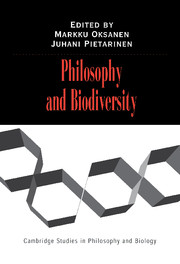Book contents
- Frontmatter
- Contents
- List of Figures and Tables
- List of Contributors
- Acknowledgements
- Philosophy and Biodiversity
- Part I USING ‘BIODIVERSITY’
- Part II UNDERSTANDING BIODIVERSITY
- 3 Plato on Diversity and Stability in Nature
- 4 Biodiversity, Darwin, and the Fossil Record
- 5 Biological Diversity, Ecological Stability, and Downward Causation
- Part III VALUING BIODIVERSITY
- Part IV PROTECTING BIODIVERSITY
- Index
- References
3 - Plato on Diversity and Stability in Nature
Published online by Cambridge University Press: 26 June 2009
- Frontmatter
- Contents
- List of Figures and Tables
- List of Contributors
- Acknowledgements
- Philosophy and Biodiversity
- Part I USING ‘BIODIVERSITY’
- Part II UNDERSTANDING BIODIVERSITY
- 3 Plato on Diversity and Stability in Nature
- 4 Biodiversity, Darwin, and the Fossil Record
- 5 Biological Diversity, Ecological Stability, and Downward Causation
- Part III VALUING BIODIVERSITY
- Part IV PROTECTING BIODIVERSITY
- Index
- References
Summary
The view that Plato was primarily interested in the nonempirical world of the Forms and disregarded the “sensible” world of natural phenomena is one-sided and misleading, if not entirely wrong. He was very much concerned with what we call empirical nature, which he believed to be in a state of constant change. “The things of which we naturally say that they ‘are’, are in process of coming to be, as the result of movement and change and blending with one another; we are wrong when we say they ‘are’, since nothing ever is, but everything is coming to be” (Theaetetus 152e). The notion of change involves a difficult conceptual problem: to say that something is changing seems to imply that it both remains the same and becomes something else; a growing tree is at every moment transforming into something else while all the while remaining the same tree.
Plato returns to the problem of change over and over again in his dialogues, and in the Timaeus he offers an especially interesting explanation for changes in the “sensible” world of nature. The explanation is rather complicated and difficult to understand in detail. However, its general dynamical tenet has an interesting affinity with our modern biological view of nature. According to Plato, the essence of nature consists of some kind of universal power that produces maximal diversity and abundance in the natural world and regulates changes in accordance with uniform laws.
- Type
- Chapter
- Information
- Philosophy and Biodiversity , pp. 85 - 100Publisher: Cambridge University PressPrint publication year: 2004



